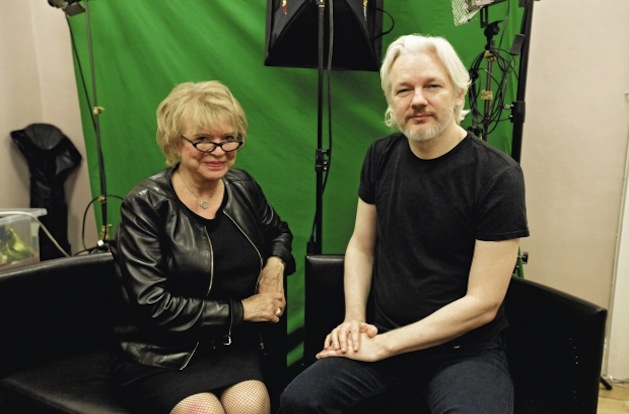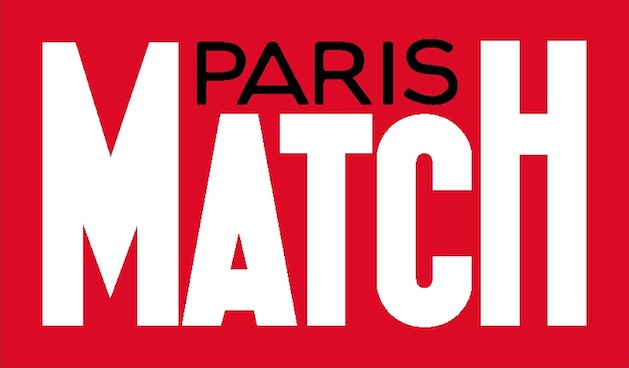Friday 28 March. The Ecuadorean Embassy in London. Behind him: a green screen, in front of which he films for Skype and the social networks. Threatened by the United States, the founder of WikiLeaks has been confined for two years to a room at the Ecuadorean Embassy in London. He was visited by Eva Joly who is working on breaking the deadlock.

The 15 square metres where he's lived as a recluse since June 2012 are overrun by computers and other electronic equipment. At 3 Hans Crescent, Knightsbridge, London, in the tiny office put at his disposal by embassy staff, there's a corner fireplace, now blocked by a table on which today sit a Mac and three computer monitors used in video editing. Nearby: a Sony high definition professional camera, and a Canon 5D. On the other side of the room, hung against the wall: a green screen used for special effects. It's bordered by a battery of projectors that gives it the appearance of a film studio. Everywhere there are books, folders, storage boxes. Assisted by a young colleague from his company Sunshine Press Productions, it's here in this 'cool' environment that Julian Assange, founder of WikiLeaks, welcomes his guests and now, for the third time, prosecutor, presidential candidate, and former judge Eva Joly.
Smiling from under a short fashionable beard, wearing a T-shirt and black jeans, the Internet activist doesn't seem too worn for the six hundred fifty days he's been cloistered, unable to exit into sunlight. But his figure has thinned, his face has widened, and his complexion and hair look even paler than before. He speaks in a slow voice and with a solemn air, his eyes on his interviewer. (His family worry about his deteriorating health.)
BRITISH TAXPAYERS DON'T GET IT: THIS SURVEILLANCE COSTS THEM €5 MILLION
In this virtual prison, under the protection of the government of Ecuador, a small Latin American country that granted him asylum, Assange says he hasn't time to get bored. 'Imagine that you were, like me, the target of the world's superpowers, responsible for making an international organisation like WikiLeaks run... You don't have a lot of free time', he quips. 'I've got nothing I can do but work. To be able to withstand the attacks of which I'm the target, you have to be very concentrated, have to exercise a lot of self-discipline. In this small space of mine here, I'm very well organised.'
Thanks to his computer equipment, the veteran programmer can stay in touch with his many faithful via Skype, the social networks, or his WikiLeaks web channel. 'I remain above all else a journalist and editor fighting for freedom of expression', he says. Despite his imprisonment, despite the financial blockade by Visa, MasterCard, PayPal, and Bank of America, he's proud that he's been able to keep WikiLeaks afloat. 'Since we released the confidential US diplomatic dispatches in 2010, we've been targeted by the Pentagon and the White House', he explains. 'Around the world, newspapers or publishers who've published these revelations have been attacked. Some of them went bankrupt. But the actions of the CIA, the FBI, and the US State Department aren't enough to kill us. WikiLeaks survives. The organisation's even in good financial health.'
IN THE UNITED STATES: 35 YEARS IMPRISONMENT
With an obsession bordering on paranoia, another of Assange's concerns is his personal safety. When he welcomes us into the room, he asks us to please not take pictures of the room's furniture or his computers, so we don't inadvertently divulge information to his enemies. Then he leads us to the window overlooking Harrods. 'Look, there in the grand circular staircase glass... There's a policeman there on duty day and night to watch me.' Assange opens one of his favourite books, 1984, on the table next to his computer keyboard. 1984 is the novel by George Orwell who over thirty years earlier so presciently described the dangers of totalitarian society where citizens come under surveillance. On a nearby shelf is found 'The Whitehall Mandarin', a British spy novel by Edward Wilson that reveals the secret methods of the US intel services designed to preserve the dominance of the United States around the world.
As the fictional person he is, Julian Assange is probably right in being so cautious. Since the summer of 2010, right after the first WikiLeaks revelations about the US military presence in Afghanistan, he's faced an arrest warrant from a Swedish prosecutor who wants to investigate accusations of 'rape' and 'sexual assault' by two women. Assange has always denied the allegations, saying they were both 'consensual relationships'. He speaks of a 'conspiracy' by the US administration, a reaction to the disclosure of those 250,000 diplomatic cables provided by WikiLeaks soldier Bradley Manning. For him, this manoeuvre by Swedish authorities has but one goal: to secure his delivery to the United States where, like Manning who was sentenced last summer, he risks long imprisonment (or worse).
For now, even if the rape allegations aren't substantiated and no charges have been brought against him, Julian Assange has been placed under an order by a British system desperate to extradite him to Sweden. Since he took refuge in the small room in the embassy of Ecuador, nearly two years ago now, an impressive police force stay deployed outside to prevent his escape. Assange notes that this has already cost British taxpayers more than €5 million, a sum that starts to wax polemic. 'It's always the same thing', he laments. 'Citizens are more concerned about their pocketbooks than protecting human rights.'
IN STOCKHOLM: EVA JOLY CHALLENGES THE AUTHORITIES

Trying to break the deadlock, Eva Joly meets with Assange for the third time on 28 March. She tells him of her efforts the day before in Stockholm with the Swedish authorities. The former anti-corruption judge, today a Minister of the European Parliament, first met Assange on Iceland in 2010, right before he came into the sights of the Swedish judiciary. 'I was leading the investigation into the causes of the Icelandic financial crisis', she remembers. 'And I was very impressed by the work of WikiLeaks. We wondered how the big bankers were able to lead the country to ruin with no one noticing anything. Then Julian Assange arrived on the scene with an idea of transforming Iceland into a haven where journalists can't be persecuted, an information paradise if you will. Assange's concept had a huge impact and led to the Icelandic Modern Media Initiative, a project to which I belong that continues to this day.'
In early 2013, when she learned he was staying at the Ecuadorean Embassy, Eva Joly came to visit Assange. And she returned again a year later. As the situation hadn't changed, she decided to travel to Stockholm to directly confront the Swedish judiciary. 'I proposed solutions where Assange would be questioned remotely', she said. 'Swedish judges can indeed travel to London the same way I traveled to Israel to interrogate a suspect in the Elf scandal. They can also question Julian Assange via video link, in the presence of his attorneys, as is already done in France. Finally, it's possible for them to use the Ecuadorean judicial system as a framework for the interrogation.' So far, Eva Joly, who's been unable to meet with the Swedish prosecutor, has received little response for her proposals, other than from the media. But the former judge hasn't given up. She plans to continue at the European level in her fight for justice for Assange, and to continue to denounce Sweden's disregard for the presumption of innocence and everyone's right to a speedy trial.
Before leaving, Eva Joly and Julian Assange pause for a long hug. Visibly moved, the head of WikiLeaks thanks the French MEP for being so supportive. 'You're a strong person', he tells her, then: 'I'd like to live in France someday.' But after four years of playing cat and mouse with Sweden and the US, including twenty-two months buried alive in that compartment at the Ecuadorean Embassy, hasn't the cost of WikiLeaks proven too high to bear?
'I pay a high price', Assange admits. 'But the challenge is worth it.'
The French weekly Paris Match is one of France's most successful and influential magazines, on occasion selling in excess of one million copies worldwide.

Theme by Danetsoft and Danang Probo Sayekti inspired by Maksimer